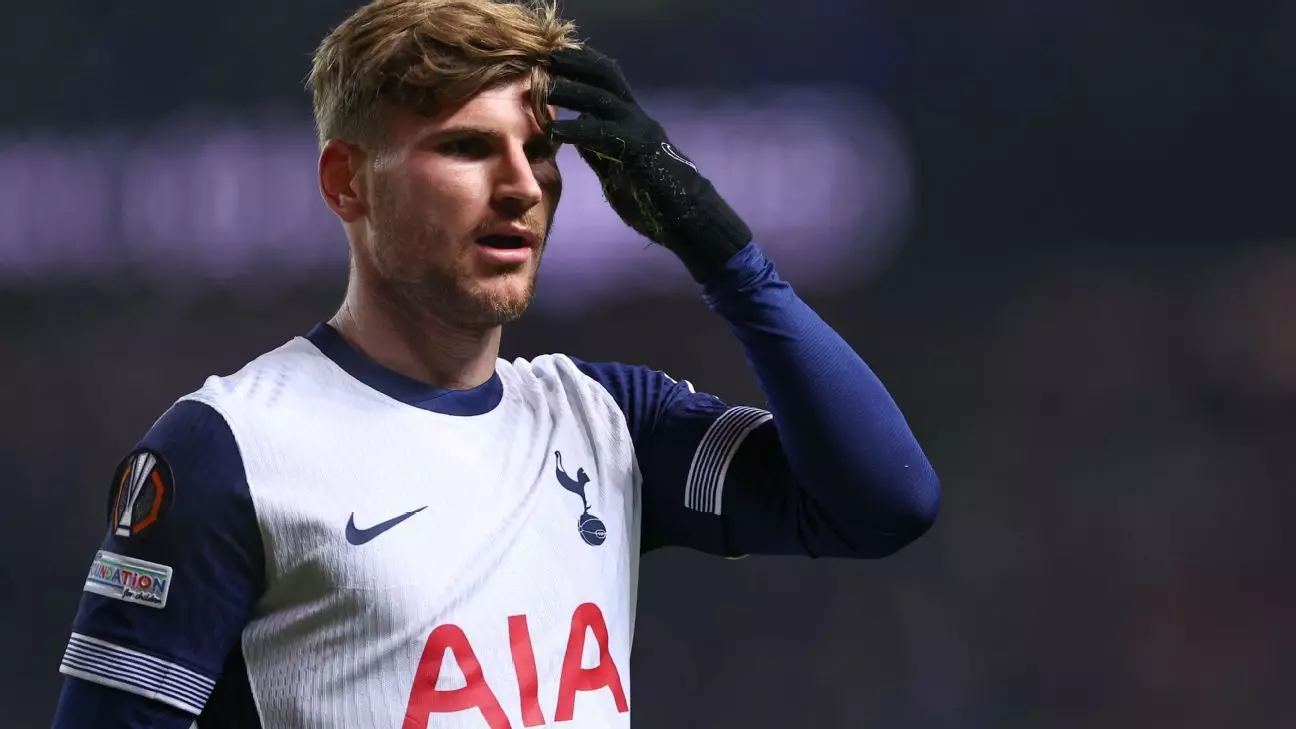In the aftermath of Tottenham Hotspur’s recent Europa League encounter against Rangers, head coach Ange Postecoglou’s comments on Timo Werner’s performance have sparked discussions on leadership and accountability within the squad. Following a disappointing 1-1 draw at Ibrox, Postecoglou did not shy away from expressing his frustration, emphasizing the need for senior players to rise to the occasion, particularly in light of an injury-depleted team.
In professional sports, the responsibility placed on experienced players is substantial, especially during challenging moments. Postecoglou’s firm assessment of Werner’s first-half performance indicates his desire for leaders to step up when the team is struggling. Werner, a seasoned international with a decorated career, was expected to set an example for younger teammates such as Archie Gray and Lucas Bergvall, who played pivotal roles in salvaging the point in Glasgow. Postecoglou’s stance highlights a critical expectation: every player must embody commitment and work ethic, particularly when the squad is facing adversity. His assertion that “it’s not acceptable” for a player of Werner’s caliber to underperform demonstrates a clear need for accountability among more experienced teammates.
However, the question arises: how does leadership manifest on the pitch? It’s more than simply fulfilling one’s role; it involves inspiring others, especially those who are less experienced. As teams often rely on their more skilled players to foster motivation and create a winning atmosphere, Postecoglou’s comments point to the need for Werner to emulate this leadership role, particularly when his teammates look to him for guidance during tough games.
Postecoglou’s explicit framing of his comments as “assessment” rather than outright criticism reveals a broader philosophy concerning personal and team development. He elucidates a key distinction: constructive feedback aims to catalyze improvement rather than diminish morale. This pragmatic approach underscores the significance of a united front within the squad; players must understand that the collective goal is paramount.
This philosophy is especially important in an environment rife with expectations. As a manager navigating a tricky period with injuries depleting the squad, Postecoglou emphasized the urgency of his approach, stating that he does not prioritize individual feelings over the team’s needs. His refusal to indulge in the “bruised egos” mentality illustrates a tough-love approach essential for cultivating resilience and discipline.
Players need to recognize that an environment focused solely on protecting egos may not facilitate success. The reality of professional football dictates that performance must come first; the standards of play must rise, and players should be held accountable for their contributions, making it clear that the club’s ambitions cannot be compromised by individual sensitivities.
The broader context of Tottenham’s current season adds weight to Postecoglou’s harsh assessment. With Spurs languishing in 11th place and trailing the top four significantly, the urgency for improvement is palpable. Their struggle for consistent away victories, with only four wins in 2024, illustrates deeper issues that require immediate attention. If the team as a whole is to develop alongside promising talents like Gray and Bergvall, the senior players must provide the performance necessary to inspire confidence.
Addressing the challenges of away games, Postecoglou dismissed the notion that attacking football is inherently more difficult outside of familiar territory. Instead, he advocated for a mindset focused on winning rather than merely avoiding defeat. This perspective is critical; a fear-based approach compromises attacking intent and can hinder a team’s development and competitive edge.
In essence, committing to an attacking philosophy provides clarity of purpose. Engaging in matches with an offensive mindset can lead to breakthroughs, even in unfavorable circumstances. Postecoglou’s tactical views reflect a comprehensive belief in progressive football and underscored his desire to see the team play with conviction and intention.
As Tottenham prepares to face bottom-of-the-table Southampton next, the need for a comprehensive performance cannot be overstated. A decisive win could serve as a turning point in the season, instilling confidence amidst adversity. In this critical matchup, Postecoglou’s challenge will be to foster a mindset focused on achievement while ensuring his players balance personal accountability with collective responsibility.
Ultimately, the onus rests not just on Werner but on each member of the team to embody resilience and ambition. The fight for success requires not only talent but also a dedication to hard work and a resolve to weather the storms that accompany professional sport. The true measure of this squad’s character will be revealed not just in individual contributions but in their unity as they confront the challenges ahead.

